Magnesium is a mineral that is important for a variety of bodily functions, including the metabolism of food, the synthesis of proteins, and the functioning of the muscles and nerves. It is found naturally in a variety of foods, including nuts, seeds, and leafy green vegetables.
Different magnesium supplements have different health benefits, so you need to understand the pros and cons of each.
The first part of this guide lists the 10 best magnesium supplements of 2023. Part two is a guide to using magnesium supplements.
1. Doctor’s Best High Absorption Magnesium Glycinate Lysinate
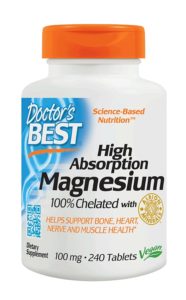
The magnesium in this supplement is chelated with two amino acids: glycine and lysine. This means the supplement has a high bioavailability and is easily absorbed by your body.
Compared to other forms of magnesium, it’s less likely to irritate your bowels and is a good option if you suffer from leaky gut syndrome.
The recommended dose of two tablets provides 200 mg of magnesium, half the recommended daily amount (RDA) for men and two-thirds of the RDA for women.
By eating foods which are high in magnesium, such as green veg, almonds, and sunflower seeds, you should easily be able to top this up to the recommended amount.
Doctor’s Best is a low cost, effective magnesium supplement that scored well in laboratory testing.
2. Natural Vitality Natural Calm Magnesium Anti Stress
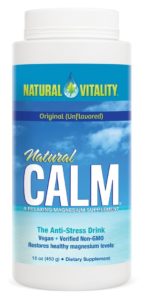
Natural Vitality’s magnesium supplement is a good option if you don’t like taking tablets or want to gradually increase your intake of magnesium.
It comes in a powder form, which you mix with water to form a drink, and is available in different flavors.
Natural Calm contains magnesium citrate, one of the most common forms of magnesium used in supplements. Its bioavailability is higher than that of magnesium oxide at around 25-30%.
Magnesium citrate helps mental and muscle relaxation. A lot of people take it before bed to help relieve anxiety and insomnia.
The downside is it pulls water into the bowels, giving a laxative effect. It’s worth starting small with this supplement and gradually increasing the dose up to the recommended limit to see how your body responds.
This is one of the most popular magnesium supplements, but one lab test found the product contained “concerning” levels of arsenic (1).
3. Metagenics Mag Glycinate
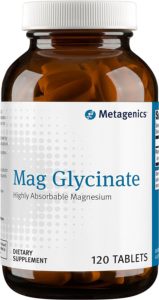
Metagenics uses magnesium glycinate in its supplement — one of the most bioavailable forms of magnesium.
When tested in the lab, the product passed all purity tests and exceeded its label claim for magnesium by 5%.
The dose per serving is 200 mg (210 mg in laboratory tests) so you’ll need to include magnesium-rich foods in your diet to meet the recommended daily amount.
This product is one of the best on the market, but, as you need to take two tablets a day to meet the recommended dose, it’s more expensive than most.
4. Designs for Health Magnesium Malate

Recommended by many doctors and chiropractors to help with muscle cramps and sleep, this brand delivers 180 mg of magnesium malate per tablet. The recommended serving of two tablets slightly exceeds the maximum recommended daily limit of magnesium from supplements (350 mg).
The magnesium is bound to malic acid, a compound that’s naturally found in apples, rhubarb and other fruit and veg.
Malic acid promotes energy through its role in the Krebs Cycle – a series of chemical reactions that helps release energy from stored carbohydrates, fat, and protein (1).
Magnesium malate can help if you suffer from low energy, fibromyalgia symptoms, and muscle pain. It also has a pretty high level of bioavailability, making it a good all-around supplement.
5. Ancient Minerals Magnesium Oil Spray
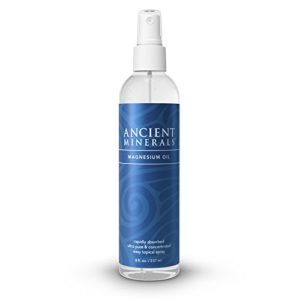
Topical magnesium supplements bypass the GI tract, avoiding the laxative effects of other supplements.
Although rigorous scientific studies of the effectiveness of magnesium absorption via the skin are limited, there is some evidence to suggest that it can contribute to boosting magnesium levels (2).
Perhaps the best anecdotal source of evidence for magnesium absorption through the skin is the renowned healing properties of the Dead Sea.
Seawater is the most plentiful source of naturally available magnesium and the levels in the Dead Sea are almost four times higher than regular seawater (3).
This magnesium oil spray contains just two ingredients: water and magnesium chloride sourced from salt in the deeply buried Zechstein Seabed. It claims to deliver 100 mg of magnesium per ml, but there are few scientific studies available to verify this claim.
6. Life Extension Neuro-Mag Magnesium L-Threonate w/ Calcium & Vitamin D3
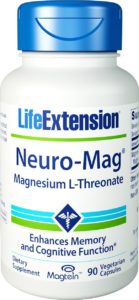
Magnesium l-threonate is the new kid on the block of magnesium supplements. It’s the only form of magnesium supplement that can cross the blood-brain barrier.
Animal testing has indicated that it may improve short and long-term memory and learning and protect the brain from cognitive decline due to aging (4).
If this all sounds too good to be true, bear in mind that there are few published studies on the effectiveness of magnesium l-threonate in humans. That said, many people have found the supplement useful for reducing brain fog and boosting concentration.
As the recommended dose contains just 144 mg of magnesium, it’s best used to target cognitive symptoms of magnesium deficiency rather than trying to replenish overall magnesium levels in the body.
7. Pure Encapsulations Magnesium (Glycinate)
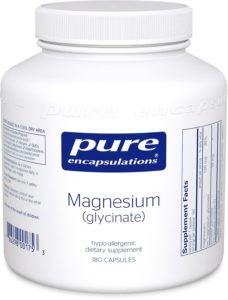
This magnesium supplement scored highly in laboratory tests on purity and product safety. It’s certified gluten free, GMO-free, vegan and hypoallergenic.
Each capsule contains a small dose of 120 mg of magnesium. Lab tests indicated that the actual magnesium content fell slightly below the claimed dose, at 109 mg.
Magnesium glycinate is one of the most bioavailable forms of magnesium, so your body will absorb a higher proportion of the magnesium that from supplements containing magnesium oxide or citrate.
If you want a high level of magnesium supplementation, then you’ll need to take 2-3 capsules a day, making this an expensive product. It’s a good option for people who eat a magnesium-rich diet and want a small boost to top up their levels.
8. MagSRT (Jigsaw Magnesium with Sustained Release Technology)
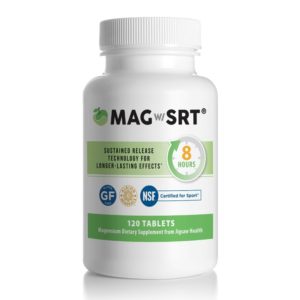
Jigsaw Health’s supplement contains magnesium malate, one of the more easily absorbed forms of magnesium.
The recommended serving provides 500 mg of magnesium – significantly more than the recommended amount – but as this is spread over 4 tablets, it’s easy to reduce the dose.
The addition of B6 and B12 helps magnesium absorption and the product is designed to release active ingredients slowly over an 8-hour period.
The company claims that the malate form of magnesium is 85% absorbable, but this seems at odds with scientific studies and comparable supplements. They do have a 90-day money-back guarantee if you’re not satisfied with the product.
9. Mag-Ox 400
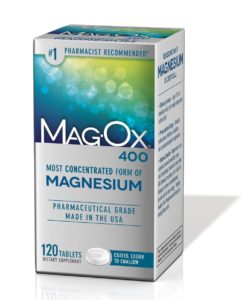
Mag-Ox is a common drugstore brand that’s often recommended by pharmacists. The suggested serving of 2 tablets contains 482.6 mg of magnesium – more than the recommended daily intake from all sources.
However, not all of this magnesium gets absorbed by your body…
The supplement contains magnesium in the form of magnesium oxide. Your body will only absorb around 4% of the elemental magnesium, so you won’t get as much of a boost from Mag-Ox as you might with other supplements.
It may not be the most effective supplement, but it’s cheap and easily available. If you suffer from constipation, it’ll help keep you regular too.
10. Natural Vitality Calm Gummies
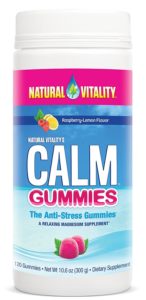
If you struggle to get your kids to take vitamin pills, these gummies are an easy way to boost their magnesium levels.
Each gummy contains 83 mg of magnesium in the form of magnesium citrate. This is slightly higher than the 65 mg recommended limit for magnesium from supplements for children under 4, and teenagers and adults may need to take several gummies to meet their recommended daily amount.
Magnesium citrate promotes mental and muscle relaxation and there is some evidence that it could help reduce hyperactivity in children (6).
It can also have a laxative effect, so it’s important not to take more than the recommended dose.
Why should you take a magnesium supplement?
Magnesium is the fourth most abundant mineral in the body and plays a role in over 300 physiological processes.
Magnesium occurs naturally in foods such as green leafy vegetables, seeds, nuts and whole grains. It’s also added to some fortified foods such as breakfast cereals.
Despite this, dietary surveys show that up to 50 percent of Americans have inadequate intakes of magnesium (7). Because it’s increasingly difficult to get as much magnesium as we need from food and water, a supplement can help top up levels of this vital mineral.
Scientific research has shown that high levels of magnesium in the body can:
- Lower the risk of type 2 diabetes
- Help improve bone mineral density which can reduce the risk of bone fractures and osteoporosis
- Help metabolize Vitamin D
- Assist in preventing migraines
- Lower the risk of some types of heart disease and stroke
- Relieve symptoms of premenstrual syndrome.
Different types of magnesium supplement
Magnesium supplements come in different forms, depending on what substance the magnesium is bound to.
Some forms of magnesium are more easily absorbed by the body than others. High levels of bioavailability mean the body can absorb more magnesium from the supplement.
Magnesium glycinate and magnesium chloride have some of the highest bioavailability, and magnesium malate has decent absorption and has been shown to boost energy levels. Despite being cheap and readily available, magnesium oxide is the poorest supplement in terms of bioavailability.
Recommended dosage
The National Institutes of Health has a list of recommended daily intakes of magnesium depending on your age and gender. These levels include magnesium from your diet AND any supplements.
The average daily recommended amount for men is 400-420 mg, and for women, 310-320 mg. Teenage girls and pregnant women need slightly higher amounts.
You don’t need to worry about limiting the amount of magnesium you get from food as your kidneys will get rid of any excess in your urine.
The recommended upper limit for magnesium from dietary supplements and medications only (i.e. excluding what you get from your diet) is 350 mg/day for adults (8).
Magnesium supplement FAQ
How do I know if I’m deficient in magnesium?
Magnesium deficiency is hard to diagnose as it doesn’t show up in routine blood tests. Because it’s involved in so many different processes, it can be tricky to pinpoint magnesium deficiency as the cause of your symptoms.
If you suffer from gastrointestinal diseases (e.g. Chron’s or celiac disease), type 2 diabetes, long-term alcoholism, or you’re over 70, then you’re more likely to be magnesium deficient (9).
When should I take magnesium?
Taking magnesium with food can help reduce the risk of diarrhea. Some people find taking magnesium supplements before bed helps them sleep.
What magnesium supplements do doctors recommend?
It is generally recommended to choose a form of magnesium that is well-absorbed by the body, as this can help to ensure that you are getting the maximum benefit from the supplement.
Some forms of magnesium that are well-absorbed by the body and may be recommended by doctors include magnesium citrate, magnesium glycinate, magnesium lactate, and magnesium threonate.
It’s important to note that the best form of magnesium for you may depend on your individual needs and health conditions. If you have any concerns about which form of magnesium is best for you, it’s a good idea to consult with a healthcare provider.
They will be able to recommend the most appropriate form of magnesium based on your specific needs and circumstances.
Is there anything that interferes with magnesium absorption?
A study has shown that high doses of zinc can interfere with magnesium absorption (10).
Diuretics can either increase or decrease the amount of magnesium lost from your body in urine, depending on the product.
Drugs used to treat the symptoms of peptic ulcers and acid reflux can cause the magnesium levels in your blood to drop if taken for a long period.
What are the side effects of too much magnesium?
Some forms of magnesium supplement can have a laxative effect and high doses can result in diarrhea, nausea and stomach cramps. Doses of more than 5,000 mg/day have been associated with magnesium toxicity which can be fatal.
Can magnesium supplements interfere with other medicines?
Yes. For example, taking bisphosphonates (used to treat osteoporosis) or antibiotics immediately before or after a magnesium supplement might affect how well they’re absorbed. Speak to your doctor or pharmacist if you’re worried about how supplements may affect your other medication.
What is the Best form of Magnesium you can take?
There are several forms of magnesium that are available as dietary supplements, and the best form for you can depend on a variety of factors, including your age, sex, and health conditions. Some common forms of magnesium include:
- Magnesium oxide: This form of magnesium is inexpensive and readily available, but it may not be easily absorbed by the body.
- Magnesium citrate: This form of magnesium is absorbed well by the body and is commonly used to treat constipation.
- Magnesium glycinate: This form of magnesium is well-absorbed by the body and may be less likely to cause gastrointestinal side effects than other forms.
- Magnesium lactate: This form of magnesium is absorbed well by the body and may be less likely to cause gastrointestinal side effects than other forms.
- Magnesium threonate: This form of magnesium is well-absorbed by the body and may be able to cross the blood-brain barrier more effectively than other forms, making it a good choice for people who want to support brain function.
It’s generally recommended to choose a form of magnesium that is well-absorbed by the body, as this can help to ensure that you are getting the maximum benefit from the supplement. If you have any concerns about which form of magnesium is best for you, it’s a good idea to consult with a healthcare provider.
Summary
Many of us don’t get enough magnesium from our diet and the addition of a magnesium supplement can boost energy and improve sleep quality, as well as improve our overall health.
Different forms of magnesium have different benefits, and you may need to try a couple of brands to find a supplement that best addresses your symptoms. If you’re taking magnesium citrate or oxide, increase your intake gradually to see how much your body can tolerate without side effects.


1 Comment
Brian · May 22, 2018 at 4:35 pm
Great comprehensive guide! Please put me on your email list for new articles coming out. I see that you put out some REALLY relevant data for those that take their health seriously!
Comments are closed.